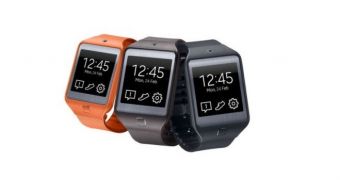Last year when it launched, the original Samsung smartwatch, the Galaxy Gear was met with budding interest. But it wasn't a perfect product, not by a long shot.
First of all, its design was pretty bulky and just didn't appeal to customers. Moreover, it has limited compatibility with other devices and came with a pretty high price-tag which managed to keep most curious customers away.
After a few months since the Galaxy Gear was made available on the market, Samsung has rushed to pull the veil off a bunch of new wearables: the Gear 2, Gear 2 Neo and Geat Fit.
The first two are smartwatches and while they have now been granted compatibility with a more extensive lists of devices, the rates at which they are being sold remain quite high ($299 / €217 for the Gear 2 and $199 / €145 for the Gear 2 Neo).
So, at this point the question is whether the smartwatches are too expensive, especially bearing in mind that Android Wear devices are in the pipe-line.
The Gear 2 is certainly an improvement from the original Galaxy Gear, but there’s still a lot of room for improvement. The smartwatch is compatible with a whole host of Samsung smartphones and tablets, but that’s about it.
So if you own another device, it would be pretty useless to purchase this $299 / €217 smartwatch. Furthermore, Samsung has dropped the Android OS and now uses its own Tizen OS with the wearable.
While the platform seems quite promising, it’s still in its infancy and pretty much experimental, so there’s no way it’s going to be able to compete with the popularity of Android Wear.
Even so, Samsung has been listed as one of the official partners to back up Google in the Android Wear endeavor, so we figure Sammy might have plans to release a wearable running this platform at some point in the future, too.
But some companies like Motorola already announced its smartwatch endeavor, the Moto 360 that comes sporting a pretty ambitious design, including Sapphire Glass, if we’re to listen to the rumors.
The advantage of Android Wear smartwatches is going to be sensed in the pricing department, where we'll going to see sensible rates. Plus, they are going to be compatible with the whole plethora of Android devices swimming out there.
Samsung has already launched the Tizen SDK inviting users to start building apps for the wearables and Google has teased theirs, but devs are most likely to adopt the latter, especially after the Tizen newness enthusiasm fades off.
So are Samsung’s wearable efforts bound to be crushed?

 14 DAY TRIAL //
14 DAY TRIAL //